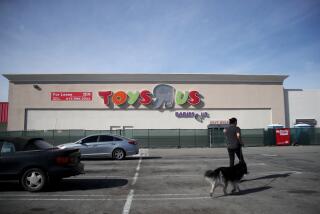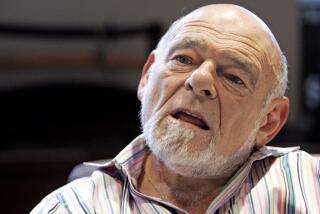Zschau as a Manager Gets Mixed Reviews : Senate Candidate’s Reputation as a Promoter Outshines Memories of Him as a Businessman
MILPITAS, Calif. — In 1969, the founder of a fledgling company called System Industries Inc. persuaded a pair of scientists to entrust their new invention, a printer that formed characters by spraying tiny dots of ink, to his company for commercial development.
Inventor Ed Kyser recalled: “We picked System Industries because of Ed Zschau,” the company’s founder who is the Republican candidate for U.S. Senate. “He seemed to have the charisma and dynamism to make our baby go.”
Charisma and dynamism were not enough. To be sure, Zschau was an excellent promoter, raising millions of dollars in venture capital from such diverse sources as the Fort Worth-based Bass brothers and the Japanese maker of Konica cameras.
But System Industries was forced to abandon the project in 1980 as a result of technical snags, manufacturing and marketing snafus and chronic shortages of cash.
“Ed was a terrific visionary,” said James L. Patterson, president and chief executive officer of Quantum Corp. and a former vice president for engineering under Zschau. “He had this fantastic ability to motivate, inspire and sell. But that didn’t always translate into effective management. Many of our operations were just plain sloppy.”
It is a widespread assessment of Zschau-as-businessman here in Silicon Valley, where Zschau headed System Industries for 13 years before his successful 1982 run for Congress. Many attribute System Industries’ failure to successfully market the ink-jet printer and other products incorporating proprietary technology to what they call Zschau’s undisciplined approach to management.
“Academics rarely make great businessmen,” said Kenneth L. Fisher, a Woodside, Calif., money manager whose clients own nearly 5% of System Industries. Zschau was an assistant professor at Stanford University’s graduate school of business when he started the company.
Zschau acknowledges that he and his associates underestimated what it would take to develop and perfect the printer, but he defends his overall record.
“It would have been wonderful if we’d have had some super proprietary product. We wanted to have that . . .,” he said.
“(But) in terms of generating jobs and the potential for economic growth, (System Industries) has been OK. It’s not been an Apple Computer, going from nothing to $1 billion in no time. But going to $100 million isn’t bad.” The company employs about 700.
Today, System Industries derives the bulk of its $98 million in annual revenues from marketing data-storage systems for mini-computers, an intermittently profitable business and one in which the company has been sued in U.S. District Court for allegedly infringing on five patents held by industry giant Digital Equipment Corp. The company denies the charges and has countersued for unfair competition and antitrust law violations.
More than 60% of System Industries’ data-storage systems--refrigerator-like boxes crammed with tape and disk drives purchased mostly from Japan’s Fujitsu Ltd.--are designed to be hooked up to Digital Equipment’s mini-computers. (Mini-computers, used mostly for scientific and engineering applications, are smaller than giant mainframes but considerably more powerful than desk-top personal computers.)
The lawsuit, filed in 1980 while Zschau was still head of the company, is scheduled for trial later this year. Zschau, who according to court records was called for a deposition in 1982 but never testified because he was too busy running for Congress, dismisses Digital Equipment’s action as “a nuisance suit.” Digital Equipment has filed similar lawsuits against several other makers of peripheral equipment for its computers.
System Industries’ patent counsel, the San Francisco firm of Townsend & Townsend, has advised the company that it “should prevail” in the litigation because the patents either are not infringed upon or are invalid, according to a filing with the Securities and Exchange Commission.
But System Industries acknowledges that a loss in the case “could materially interrupt the company’s business and have a material adverse effect on a significant portion of the company’s revenue and net income.” Earlier this month, Judge Robert E. Keeton ruled against System’s bid for summary judgment. “I am unable to determine from the submissions before me that there is no genuine dispute of material fact,” the judge wrote.
‘Mouse to DEC’s Elephant’
“We’re like a mouse to DEC’s elephant, always trying to stay away from the elephant’s feet,” said D. Kent Winton, System Industries’ senior vice president for marketing. “For all his strengths, Ed was never able to endow the company with a technological kernel.”
In short, though Zschau’s campaign has cloaked him in the mystique of Silicon Valley, neither the company he founded nor his personal fortune is the stuff of legend. The entrepreneur’s 4.61% stake was valued at $1.1 million when System Industries first offered shares to the public in September, 1980.
Today, he said, he holds less than 1% of the company’s stock with a value of more than $250,000, having sold “bits and pieces as I’ve needed money” to put two children through college and buy a second home in Washington.
System Industries went public at $8 a share (adjusted for a subsequent 2-for-1 stock split) and had climbed to around $17 a share by February, 1982, when Zschau resigned as president and chief executive officer to run for Congress. In 1981, the company posted net income of $5.9 million, or $1.33 a share, on total revenues of $62.9 million.
Profits Tumble
But profits skidded in 1982 and 1983 under Zschau’s handpicked successor, Harold O. Shattuck, a veteran of IBM and Amdahl Corp. By 1984, System Industries was posting operating losses that continued into 1985 and caused the stock to fall to as low as $3.50 a share.
Shattuck, who several directors said resigned under pressure in November of 1984, did not return calls seeking comment. Detractors say he got into trouble by expanding too rapidly and failing to prune expenses when business soured.
“In 1983, he wanted to open five European subsidiaries in six months,” said senior vice president for marketing Winton. “Any one of them should have taken a year.”
But Shattuck’s supporters--including a former member of the board of directors who asked to remain anonymous--say the company was headed for a fall when Zschau departed. “Costs were high, manufacturing was sloppy and the company was slow to introduce new products,” contends money manager Fisher.
Zschau acknowledges that he “did not have the next generation of products in place” when he left the company. He added: “It’s important not to try to figure out who is to blame for things. . . . I don’t know what happened. Maybe the eye was taken off the ball.”
Turning the Corner
In any case, the company appears to be turning around. James K. Dutton was appointed president and chief executive in May, 1985. Together with Chairman Eugene R. White, who is also chairman of Amdahl Corp., Dutton returned the company to profitability with the help of a $5.1-million infusion of capital by Los Angeles-based Brentwood Associates. The company posted net income of $2.8 million on revenues of $74.9 million in the nine months ended April 27, 1986, and the stock has climbed back to around $9.50.
Brentwood has a long history of involvement with System Industries; it was one of three venture capital groups to provide funding for System Industries in 1974, and Brentwood general partner B. Kipling Hagopian is a major fund-raiser in Zschau’s Senate race.
“I’ve told Ed many times that we’d back him if he ever wanted to start another company,” said Hagopian, a former member of System Industries’ board of directors.
Current board member James R. Bergman, a general partner in Princeton, N.J.,-based Data Science Ventures, provides this assessment of Zschau:
‘Company Lacked Focus’
“He is a good leader. But early on, the company lacked focus, and he was too optimistic about how certain products would develop.”
Bergman specifically cited the company’s experience with the ill-fated ink-jet printer and its disastrous attempt to sell computerized data-management systems for hospital clinics.
“An awful lot of companies would have folded up given those difficulties,” Bergman said.
Zschau had no firm product plans when he went into business. “I had a desire to go out and do it myself, to test myself” after several years of teaching business theory and strategy, Zschau recalled. “It wasn’t that I’d spotted a market need and decided to fill it.”
Teaming up with computer expert Peter Olson, Zschau set out to raise some capital. “Pete was the technology expert,” Zschau said. “My role was to provide the glue, raise the money, be a cheerleader and provide overall business management.”
$2 Million Raised
Zschau raised $2 million in venture capital, tapping his former student Sid Bass of the Bass brothers for half that sum. The company’s first product was a data processing system for a scientific instrument called a gas spectrometer, but, according to Winton, the company’s “great hope was always the ink-jet printer.”
The system used Digital Equipment mini-computers, and eventually System Industries realized that it could use its expertise in data-storage devices to sell into a broader market.
“But all the time, in the back of our mind, we had this great printer that was going to take the market by storm,” Winton said. Olson, who left System Industries in 1974, now says he was disappointed by the slow growth of the company.
But Zschau was not discouraged. “Ed’s a guy who never gives up,” said System Industries director Wendell G. VanAuken III, who is also treasurer of Zschau’s campaign. “He sweated and worked for 10, 12 years before the company went public. Most of that time, nobody knew whether the company would survive another six months.”
Morale Boosters
Indeed, there were frequent layoffs during those early years, but Zschau managed to keep morale up by hosting frequent companywide gatherings, including annual Thanksgiving dinners.
“He used to joke that the difference between IBM and System Industries was that IBM had a company song,” Winton recalled. So Zschau, who used to entertain his students at Stanford with a song about linear programming, wrote a song that he would sing while strumming his guitar at the company gatherings.
It was not the last song that he would write. In 1978, while lobbying for a reduction in the capital-gains tax rate as chairman of a task force of the American Electronics Assn., Zschau recorded a song he called “Old Risk Capital Blues” and sent a copy to every member of Congress.
We’ve got those old risk capital blues.
Folks don’t invest, consumes what they choose.
The gains are what attracts ‘em,
But not when we high tax ‘em.
And there’s much risk they can lose.
Quirky, perhaps, but the tax rate was cut from nearly 50% to 28%. Zschau says the experience whet his appetite for a larger role in public policy and led to his decision to leave the business world for a third career in politics. Ever the showman, he is still writing songs--only now they are for audiences on the campaign trail.






